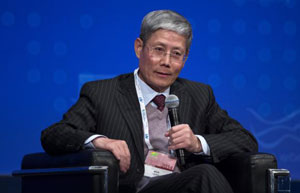BMW i8
(chinadaily.com.cn) Updated: 2014-04-21 16:10

BMW i stands for tailor-made vehicle concepts, sustainability along the entire value chain, complementary mobility services and a new understanding of premium. The brand takes into consideration worldwide ecological, economic and social change. In addition to the BMW i3 (fuel consumption combined: 0.0 l/100 km; CO2 emissions combined: 0 g/km), BMW i wil be offering a further, uniquely fascinating model as of 2014 – the plug-in hybrid sports car BMW i8 (fuel consumption combined: 2.1–0.0 l/100 km; CO2 emissions combined: 49–0 g/km). The BMW i3 and BMW i8 will be presented for the first time as series-production versions in the important Chinese market. These models have already reaped numerous international awards for their sustainability-focused concept, their design and the mobility services offered by BMW i.
Conceptual and technological development at BMW i is underpinned by extensive research and development work. At the same time, there have been large-scale field studies to examine the behavior of purely electrically powered vehicles in everyday traffic conditions. In the process, a great deal of valuable experience has been gained and is reflected in the innovative vehicle concepts and mobility solutions offered by BMW i. Characteristic BMW driving pleasure in conjunction with emission-free mobility, cutting-edge design, intelligent lightweight construction as well as resource-conserving and energy-saving production methods complement each other to create the unique premium characteristics of BMW i automobiles such as the new all-electric BMW i3 and the BMW i8 plug-in hybrid sports car.
Sustainability that also embraces the production process.
What makes the BMW i approach so unique is the revolutionary, holistically sustainable concept which ranges from initial development and design, production and utilization right up to recycling and offers, in all respects, sustainability at the same level as conventional BMW standards in terms of quality and driving pleasure. BMW i thinks beyond the actual vehicle itself and makes allowances for the entire value chain. For example, BMW i vehicles are produced at the BMW Leipzig plant using electricity that is gained directly from wind turbines located on the factory premises and – thanks to a new production method – built using a fraction of the energy that is required for conventional vehicle construction. For the very first time at this factory, premium automobiles are being produced that are designed from the outset to be powered solely by electricity or by a plug-in hybrid drive system respectively. These are vehicles that, unlike so-called conversion models, are not based on conventional automobile structures and merely equipped with additional electric components, but vehicles that are designed right from the start to attain sustainable electric mobility.
- Eggs for gold
- $3b in lock-up shares eligible for trade
- Buffett at Berkshire Hathaway's shareholder's meeting 2014
- China's April services growth quickens slightly
- Exploring the latest Apple-Samsung dispute
- HK stocks close 0.57% higher - May 2
- Ford announces new global CEO
- Nike CEO says could shift China production over labor strife
















